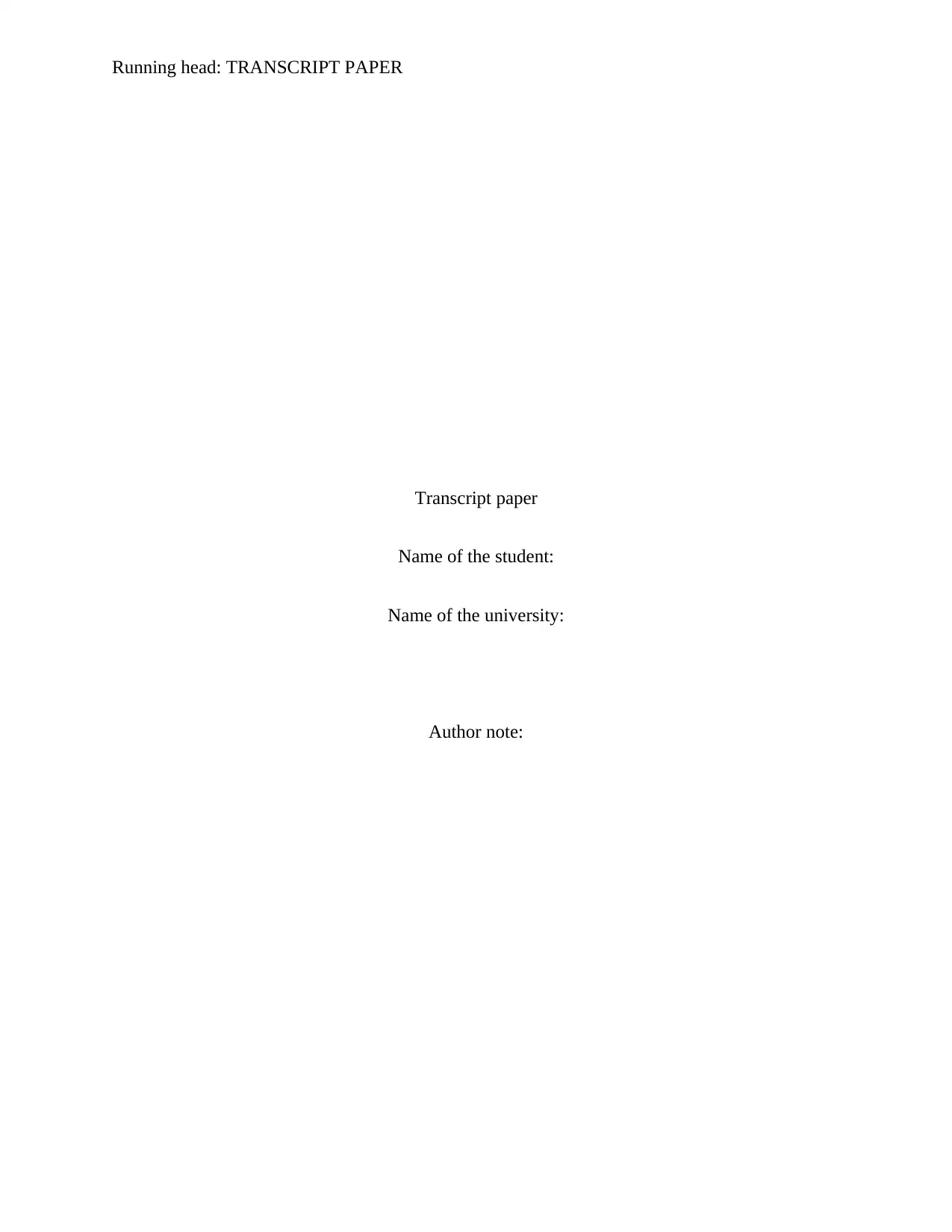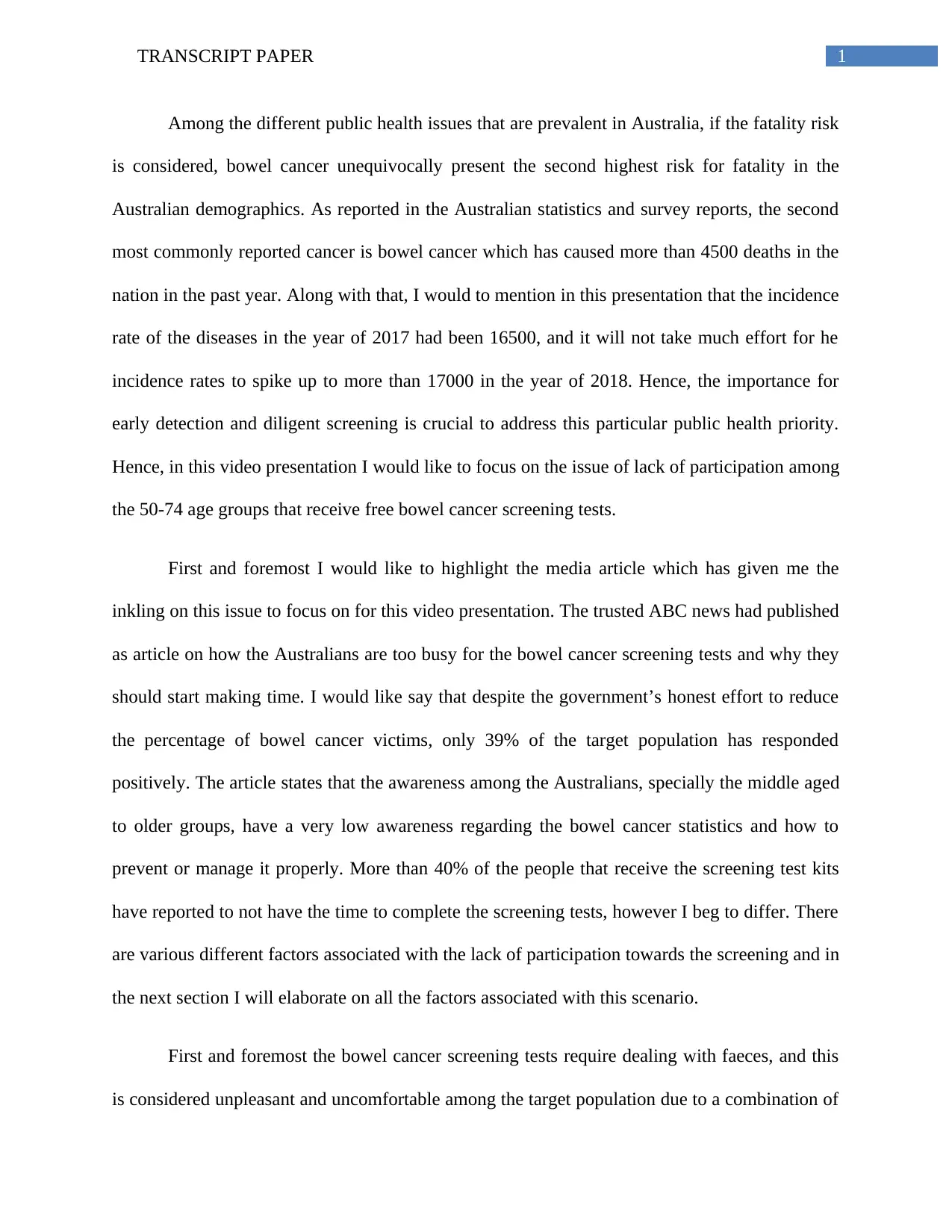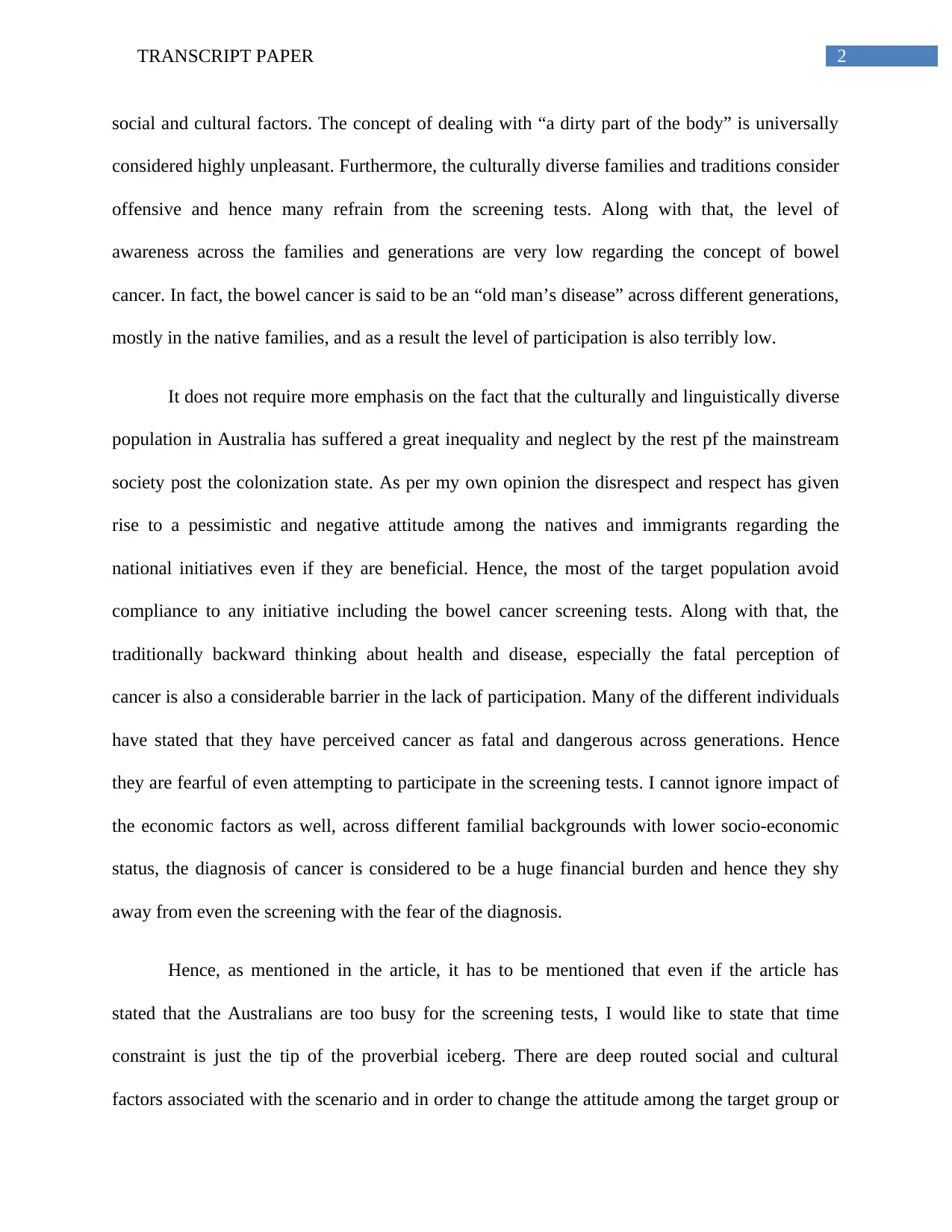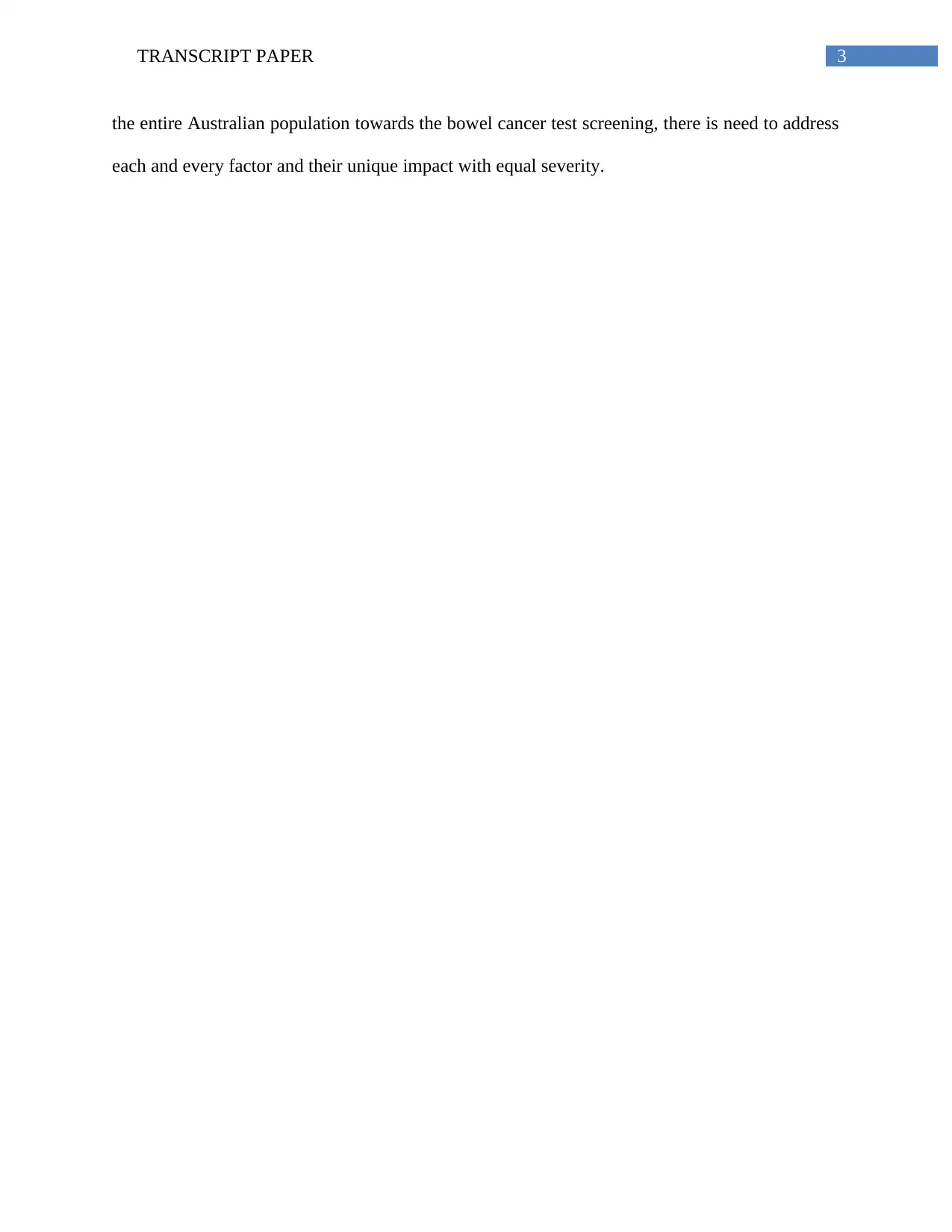NUR121 Assessment Task 2: Factors Influencing Bowel Cancer Screening
VerifiedAdded on 2023/06/13
|4
|826
|55
Presentation
AI Summary
This presentation addresses the public health issue of low participation in bowel cancer screening among Australians aged 50-74, despite the availability of free screening tests. It highlights that while a lack of time is often cited as a barrier, deeper social, cultural, and economic factors are at play. These include discomfort with handling feces, cultural beliefs, fatalistic perceptions of cancer, and concerns about the financial burden of diagnosis. The presentation emphasizes the need to address these underlying factors to improve screening rates and ultimately reduce bowel cancer fatalities in Australia. Desklib provides access to similar solved assignments and past papers.

Running head: TRANSCRIPT PAPER
Transcript paper
Name of the student:
Name of the university:
Author note:
Transcript paper
Name of the student:
Name of the university:
Author note:
Paraphrase This Document
Need a fresh take? Get an instant paraphrase of this document with our AI Paraphraser

1TRANSCRIPT PAPER
Among the different public health issues that are prevalent in Australia, if the fatality risk
is considered, bowel cancer unequivocally present the second highest risk for fatality in the
Australian demographics. As reported in the Australian statistics and survey reports, the second
most commonly reported cancer is bowel cancer which has caused more than 4500 deaths in the
nation in the past year. Along with that, I would to mention in this presentation that the incidence
rate of the diseases in the year of 2017 had been 16500, and it will not take much effort for he
incidence rates to spike up to more than 17000 in the year of 2018. Hence, the importance for
early detection and diligent screening is crucial to address this particular public health priority.
Hence, in this video presentation I would like to focus on the issue of lack of participation among
the 50-74 age groups that receive free bowel cancer screening tests.
First and foremost I would like to highlight the media article which has given me the
inkling on this issue to focus on for this video presentation. The trusted ABC news had published
as article on how the Australians are too busy for the bowel cancer screening tests and why they
should start making time. I would like say that despite the government’s honest effort to reduce
the percentage of bowel cancer victims, only 39% of the target population has responded
positively. The article states that the awareness among the Australians, specially the middle aged
to older groups, have a very low awareness regarding the bowel cancer statistics and how to
prevent or manage it properly. More than 40% of the people that receive the screening test kits
have reported to not have the time to complete the screening tests, however I beg to differ. There
are various different factors associated with the lack of participation towards the screening and in
the next section I will elaborate on all the factors associated with this scenario.
First and foremost the bowel cancer screening tests require dealing with faeces, and this
is considered unpleasant and uncomfortable among the target population due to a combination of
Among the different public health issues that are prevalent in Australia, if the fatality risk
is considered, bowel cancer unequivocally present the second highest risk for fatality in the
Australian demographics. As reported in the Australian statistics and survey reports, the second
most commonly reported cancer is bowel cancer which has caused more than 4500 deaths in the
nation in the past year. Along with that, I would to mention in this presentation that the incidence
rate of the diseases in the year of 2017 had been 16500, and it will not take much effort for he
incidence rates to spike up to more than 17000 in the year of 2018. Hence, the importance for
early detection and diligent screening is crucial to address this particular public health priority.
Hence, in this video presentation I would like to focus on the issue of lack of participation among
the 50-74 age groups that receive free bowel cancer screening tests.
First and foremost I would like to highlight the media article which has given me the
inkling on this issue to focus on for this video presentation. The trusted ABC news had published
as article on how the Australians are too busy for the bowel cancer screening tests and why they
should start making time. I would like say that despite the government’s honest effort to reduce
the percentage of bowel cancer victims, only 39% of the target population has responded
positively. The article states that the awareness among the Australians, specially the middle aged
to older groups, have a very low awareness regarding the bowel cancer statistics and how to
prevent or manage it properly. More than 40% of the people that receive the screening test kits
have reported to not have the time to complete the screening tests, however I beg to differ. There
are various different factors associated with the lack of participation towards the screening and in
the next section I will elaborate on all the factors associated with this scenario.
First and foremost the bowel cancer screening tests require dealing with faeces, and this
is considered unpleasant and uncomfortable among the target population due to a combination of

2TRANSCRIPT PAPER
social and cultural factors. The concept of dealing with “a dirty part of the body” is universally
considered highly unpleasant. Furthermore, the culturally diverse families and traditions consider
offensive and hence many refrain from the screening tests. Along with that, the level of
awareness across the families and generations are very low regarding the concept of bowel
cancer. In fact, the bowel cancer is said to be an “old man’s disease” across different generations,
mostly in the native families, and as a result the level of participation is also terribly low.
It does not require more emphasis on the fact that the culturally and linguistically diverse
population in Australia has suffered a great inequality and neglect by the rest pf the mainstream
society post the colonization state. As per my own opinion the disrespect and respect has given
rise to a pessimistic and negative attitude among the natives and immigrants regarding the
national initiatives even if they are beneficial. Hence, the most of the target population avoid
compliance to any initiative including the bowel cancer screening tests. Along with that, the
traditionally backward thinking about health and disease, especially the fatal perception of
cancer is also a considerable barrier in the lack of participation. Many of the different individuals
have stated that they have perceived cancer as fatal and dangerous across generations. Hence
they are fearful of even attempting to participate in the screening tests. I cannot ignore impact of
the economic factors as well, across different familial backgrounds with lower socio-economic
status, the diagnosis of cancer is considered to be a huge financial burden and hence they shy
away from even the screening with the fear of the diagnosis.
Hence, as mentioned in the article, it has to be mentioned that even if the article has
stated that the Australians are too busy for the screening tests, I would like to state that time
constraint is just the tip of the proverbial iceberg. There are deep routed social and cultural
factors associated with the scenario and in order to change the attitude among the target group or
social and cultural factors. The concept of dealing with “a dirty part of the body” is universally
considered highly unpleasant. Furthermore, the culturally diverse families and traditions consider
offensive and hence many refrain from the screening tests. Along with that, the level of
awareness across the families and generations are very low regarding the concept of bowel
cancer. In fact, the bowel cancer is said to be an “old man’s disease” across different generations,
mostly in the native families, and as a result the level of participation is also terribly low.
It does not require more emphasis on the fact that the culturally and linguistically diverse
population in Australia has suffered a great inequality and neglect by the rest pf the mainstream
society post the colonization state. As per my own opinion the disrespect and respect has given
rise to a pessimistic and negative attitude among the natives and immigrants regarding the
national initiatives even if they are beneficial. Hence, the most of the target population avoid
compliance to any initiative including the bowel cancer screening tests. Along with that, the
traditionally backward thinking about health and disease, especially the fatal perception of
cancer is also a considerable barrier in the lack of participation. Many of the different individuals
have stated that they have perceived cancer as fatal and dangerous across generations. Hence
they are fearful of even attempting to participate in the screening tests. I cannot ignore impact of
the economic factors as well, across different familial backgrounds with lower socio-economic
status, the diagnosis of cancer is considered to be a huge financial burden and hence they shy
away from even the screening with the fear of the diagnosis.
Hence, as mentioned in the article, it has to be mentioned that even if the article has
stated that the Australians are too busy for the screening tests, I would like to state that time
constraint is just the tip of the proverbial iceberg. There are deep routed social and cultural
factors associated with the scenario and in order to change the attitude among the target group or
⊘ This is a preview!⊘
Do you want full access?
Subscribe today to unlock all pages.

Trusted by 1+ million students worldwide

3TRANSCRIPT PAPER
the entire Australian population towards the bowel cancer test screening, there is need to address
each and every factor and their unique impact with equal severity.
the entire Australian population towards the bowel cancer test screening, there is need to address
each and every factor and their unique impact with equal severity.
1 out of 4
Your All-in-One AI-Powered Toolkit for Academic Success.
+13062052269
info@desklib.com
Available 24*7 on WhatsApp / Email
![[object Object]](/_next/static/media/star-bottom.7253800d.svg)
Unlock your academic potential
Copyright © 2020–2026 A2Z Services. All Rights Reserved. Developed and managed by ZUCOL.

